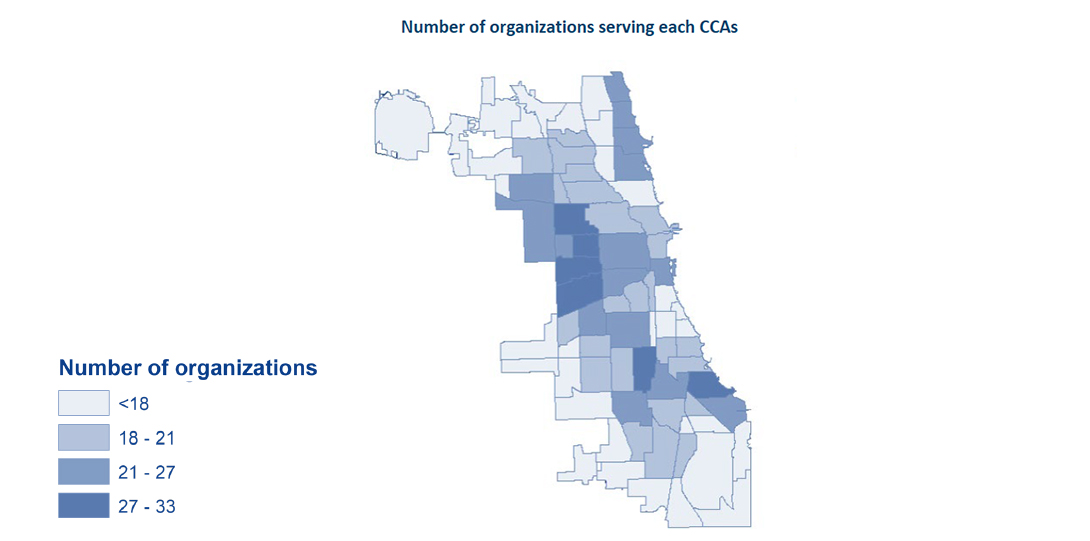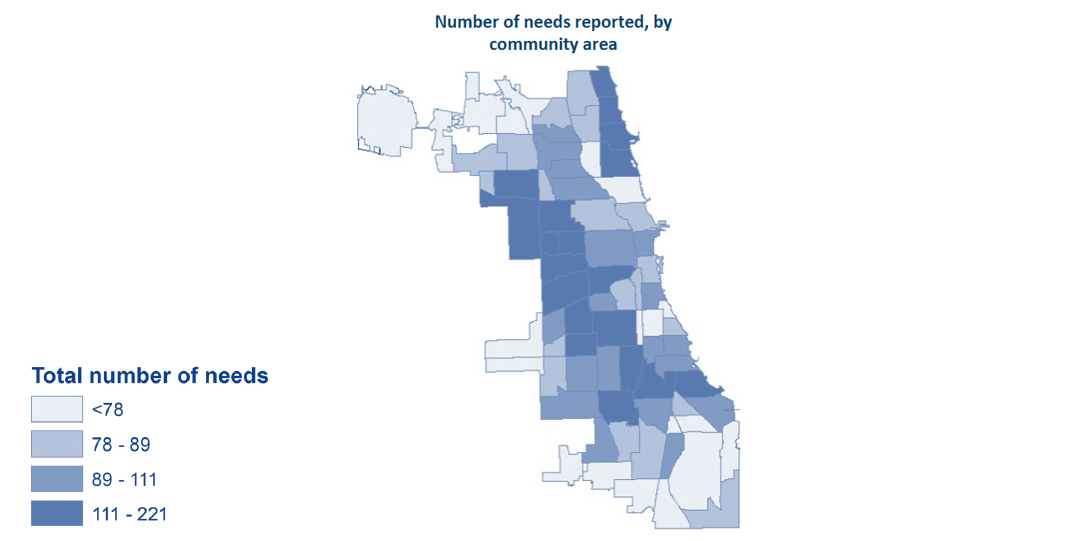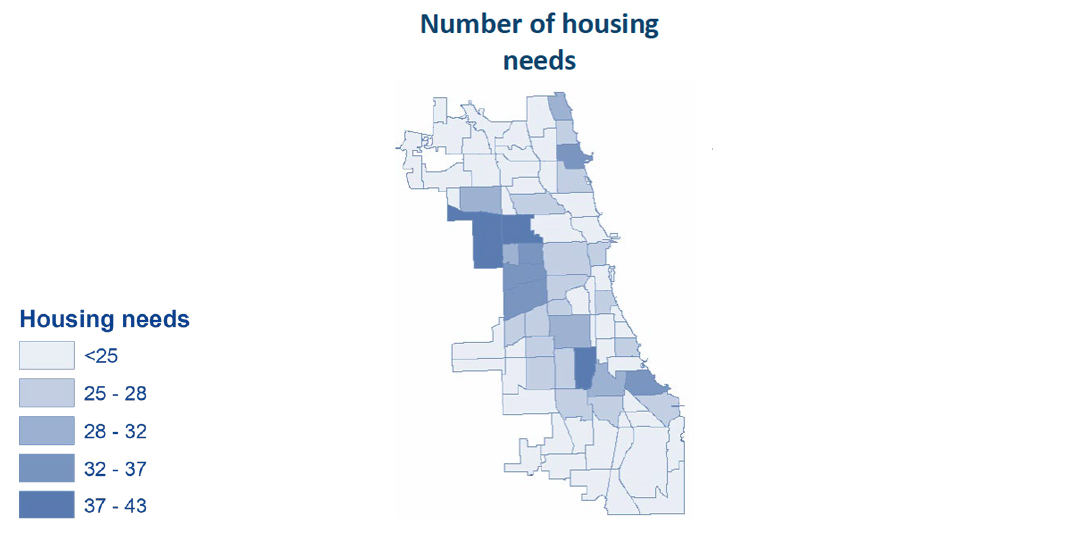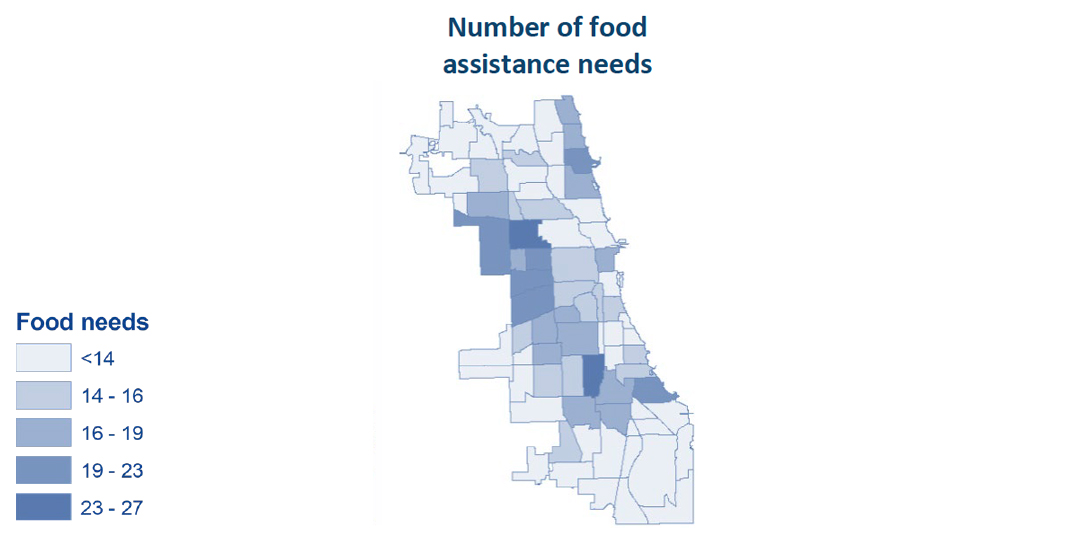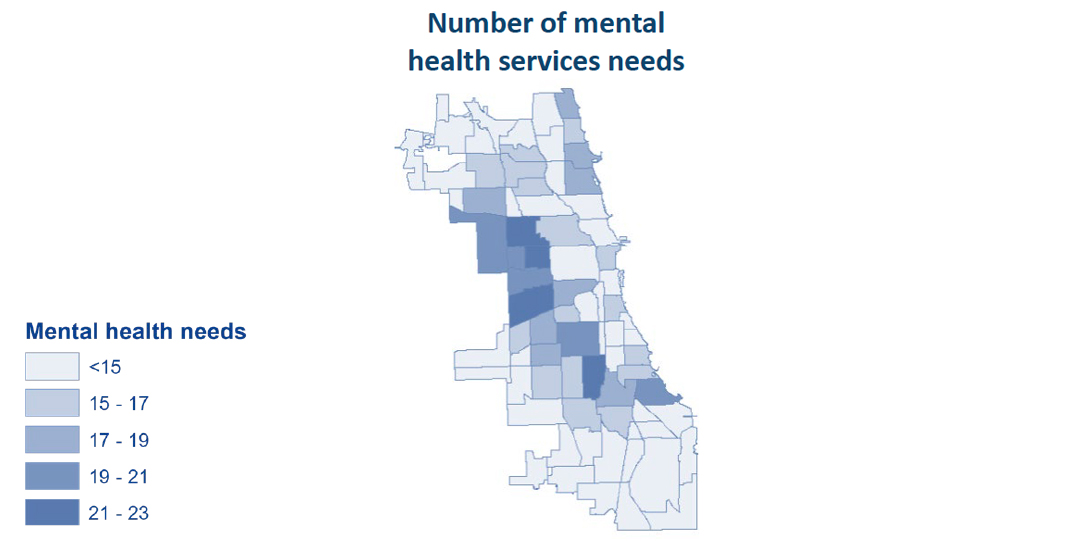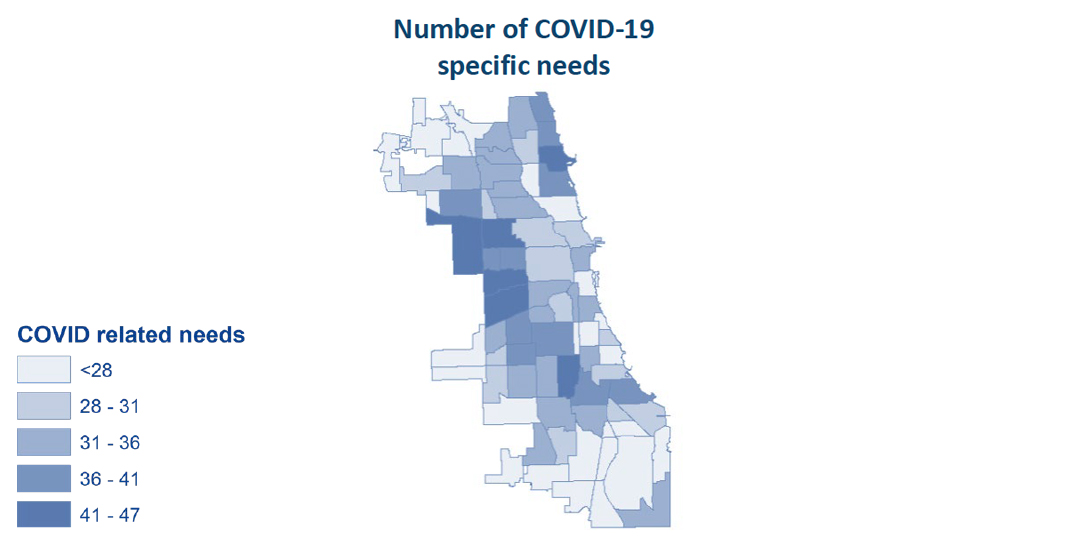Community-Based Organizations COVID-19 Needs Assessment

Intro text
On April 10, 2020, in conjunction with the Center for Health Equity Research Chicago (CHER) we launched a brief, community-based needs assessment, meant to capture the organizational and client needs of Chicago’s diverse community-based service organizations as they worked to respond to COVID 19. This point-in-time assessment covers the period of April 10th through April 29th,, 2020. This is after the Governor’s first stay-at-home directive, issued on March 20th, 2020, and includes the April 17th announcement that all schools in Illinois would remain closed for the remainder of the school year.
Major findings
- Emergency financial support was the single biggestorganizational need
- Food was the client need reported most by organizations
- About 80 percent of organizations reported that clients had reported an increase in depression, anxiety and othermental health problems
- Extent of needs varied based on community area
The landscape of inequity and community need in Chicago was well-established long before we entered the era of COVID. As the city, state and federal governments work to address the unprecedented medical and economic needs emerging from the COVID pandemic, it is clear that community-based, community service organizations will be vital to these on-going efforts.
Download the full report
Organizations
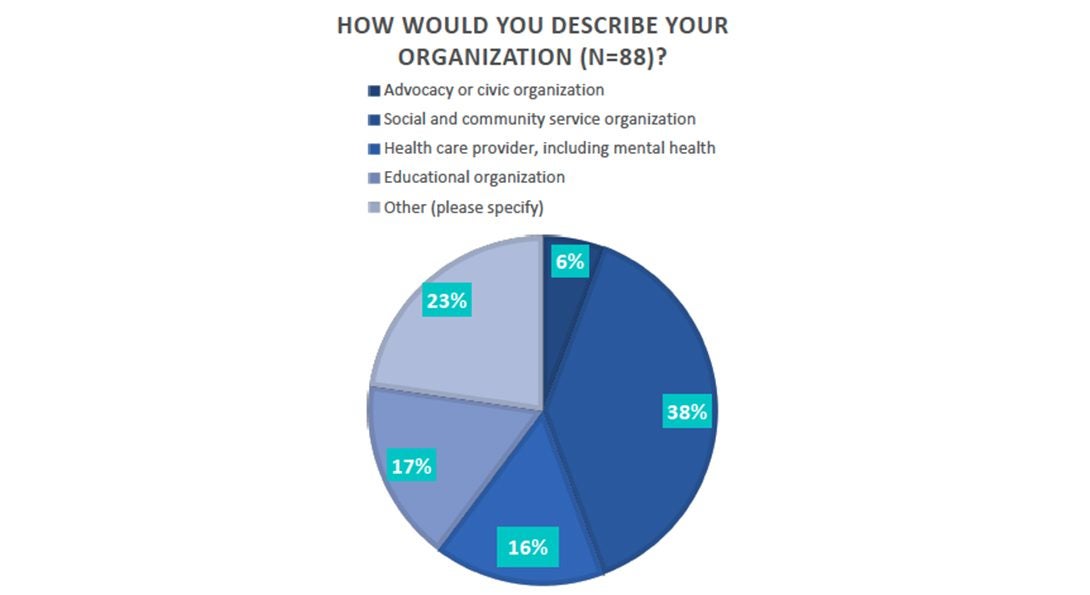
Eighty-eight unique organizations responded, and met organizational criteria. Organizations were included if they were located in and served Chicago communities, and if they provided direct services to the community.
Those who selected “other” organizational type included youth service agencies, housing organizations, as well as multi-service organizations who provided all of the services or activities listed.
Services provided and numbers served
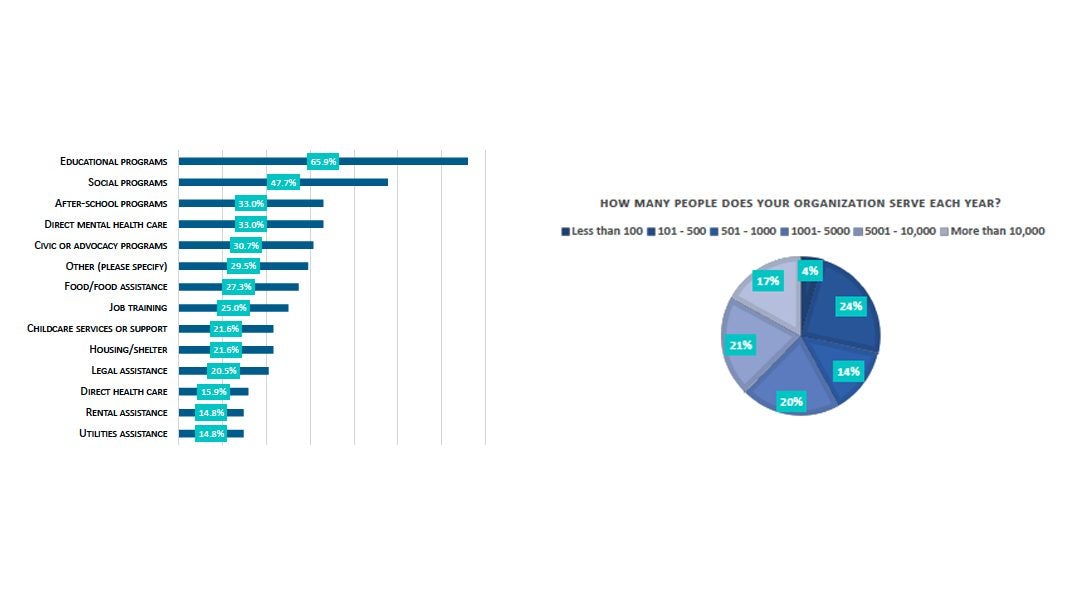
When asked what types of services their organizations typically provided, organizations reported a wide range of services and resources. A majority of organizations (66 percent) said they provided educational programming of some type. “Other” services provided included referrals and case management, and sports and youth development programming.
Current client needs
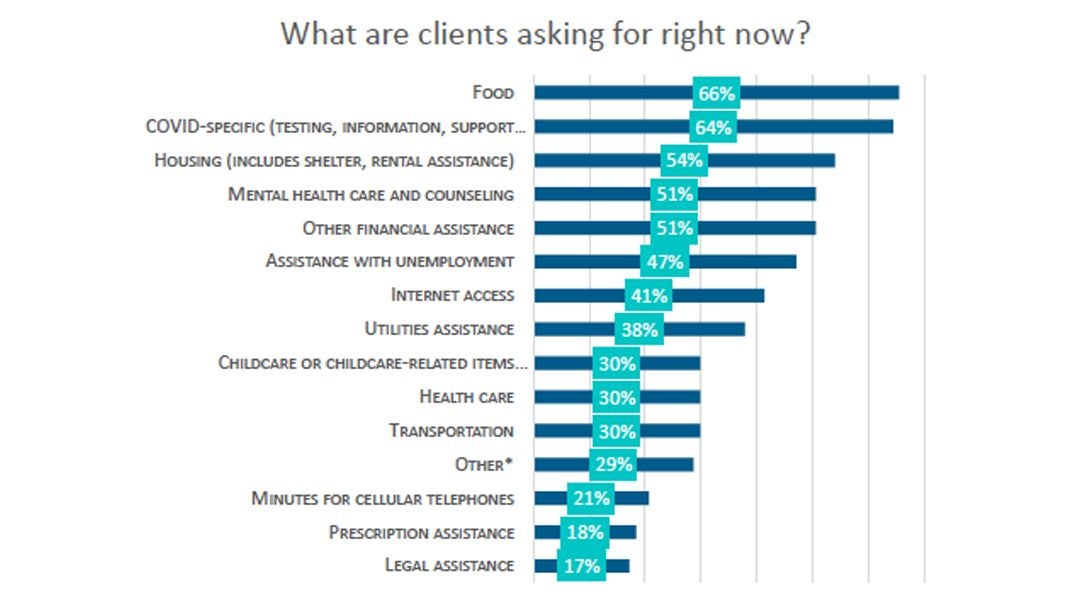
During the survey period, organizations reported a wide range of client needs, often on top of the types of services the organization usually provided. For example, nearly 70 percent stated that the people they serve were in need of food, though only 27.3 percent of organizations said that food assistance was a service they typically provided.
Not surprisingly, COVID-specific needs were the second most commonly reported category of client need. This category included general information about COVID, testing information, and information about support programming related to COVID.
For those reporting “other” needs, these included: support for students learning from home, support around bereavement, including funerals and cremation, and violence prevention interventions.
Where are services provided and where is need greatest?
We asked organizations which Chicago community areas they served. All 77 community areas were served by at least one organization. The maps below show the total number of organizations serving each community area and the total number of needs reported by community area. The top five areas served were the Englewood, Humboldt Park, South Lawndale, South Shore, and North Lawndale communities.
Because participating organizations predominantly provided services in west and south side communities, the concentration of reported needs were also higher in those same communities. North side communities such as Uptown, Edgewater and Rogers Park also emerged as a community areas with high numbers of total needs.
In addition to needs of individual organizations, we also considered the extent of need based on community areas served. This was determined by both the number of participating organizations, as well as the number of community areas they reported serving.
- Housing related needs were most reported in Englewood, Austin, Humboldt Park, South Shore neighborhoods.
- Food assistance needs were most reported in Englewood, Humboldt Park, South Shore, South Lawndale, and Austin neighborhoods.
- Mental health needs were most reported in Englewood, Humboldt Park, South Lawndale, East Garfield Park, and South Shore.
- COVID-19 related needs were most reported in Englewood, Humboldt Park, South Lawndale, Uptown, and Austin.
Most pressing needs
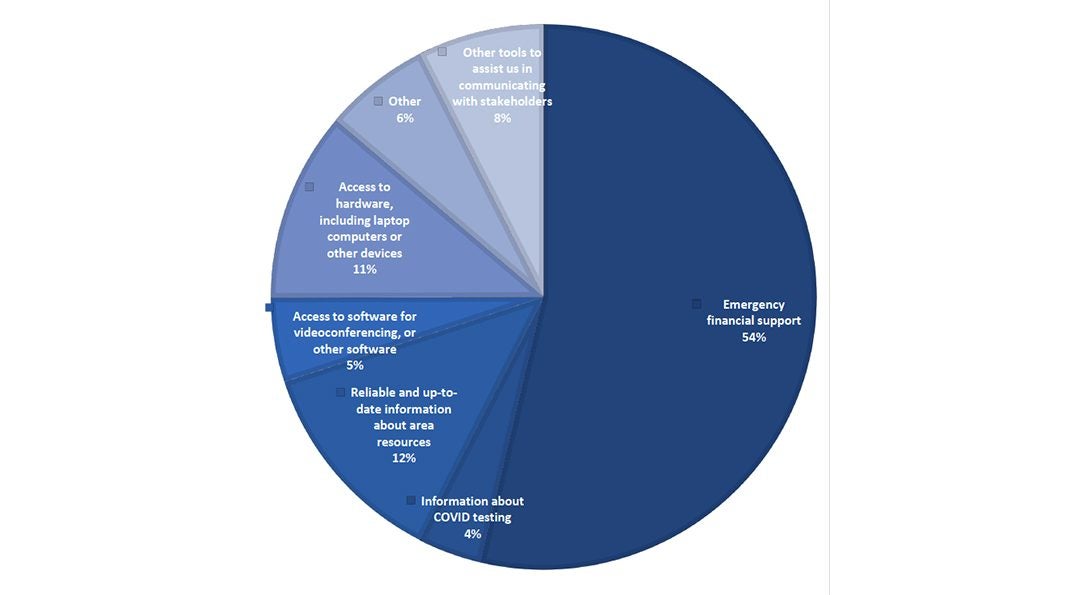
We asked organizations to tell us what their single most critical need was, at that moment. Among those who responded, a majority said they needed emergency financial support.
COVID-19 experiences
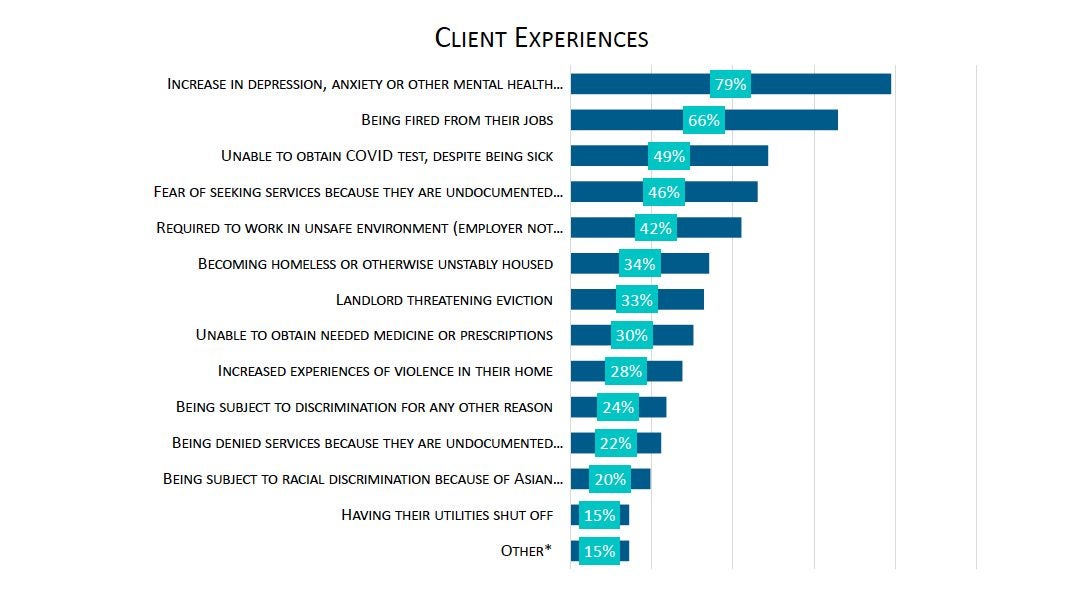
Respondents were asked to report on potentially negative experiences that their clients had been reporting, since the onset of the COVID pandemic in January, 2020. Nearly four out of five (79 percent) organizations reported that their clients were reporting increases in mental health problems.
Another 66 percent said that clients had been fired from their jobs.
Finally, one out five said that clients had experienced racial discrimination as a direct result of being Asian, or that clients had experienced discrimination for other reason(s).
Organizational comments
As worried as we are about the days and weeks ahead, we are even more concerned about the long-term impact. Months and years from now, people will still be struggling but it may not be a newsworthy story.
Organizational comments, continued.
The homeless people we serve have been shut out of their shelters and they ride the red and blue CTA lines all night…can something be done about this? It seems like a very very unsanitary and crowded place to be. If I were the COVID-19 virus, this is where I would go to spread myself around!
Organizational comments, continued.
We are providing emergency food assistance to 500 seniors living in Auburn-Gresham and Englewood. This is outside of our normal operations, which usually involves growing food with youth and seniors…we are also learning daily about even more seniors struggling with simple things like getting groceries to their homes due to concerns about leaving the house. Many are begging for deliveries and there really is not enough being done to address the situation.
Organizational comments, continued.
We specifically work on child sexual abuse prevention and intervention along with police and DCFS. We are highly concerned about the reduction in reports of child abuse to the state hotline and what this means for children, and what it will mean for our organization once the crisis is over.
Organizational comments, continued.
There is considerable stress put on parents and children, many of whom live in apartments where there is little room for “social distancing,” let alone “stress-free environments” where virtual learning is supposed to be taking place.
Summary
This brief survey demonstrates that Chicago’s community-based organizations face increased community needs due to the COVID-19 pandemic, including needs which may fall outside of organization’s typical service and programmatic areas. Consequently, among the organizations that participated in our survey, regardless of size or which communities they served, a majority were most in need of emergency financial support.
Community needs in response to COVID-19 are great. In addition to wanting more information and resources related to COVID specifically, a majority of organizations reported clients in need of food, housing assistance, mental health counseling, and financial assistance. These needs exist alongside clients’ reports of job loss, unstable housing or threats of eviction, and fear of seeking services due to undocumented status.
As shown in this report, the community areas in greatest need are those that have historically lacked access to healthcare and social services. Crises, such as the COVID-19 pandemic, reaffirm both the strengths and weaknesses of our city. One strength is the many strong, active community organizations that serve diverse communities throughout Chicago. But the weaknesses of our city and society— structural violence and structural racism, that have left legacies of social, economic, and health inequities and vulnerabilities— continue to disproportionately affect resource poor and racial/ethnic minority communities, in turn, heightening risks related to COVID. To wit, as of this writing, the number of confirmed cases of COVID-19 are rapidly rising in Latinx communities, and the rate of COVID deaths continues to be highest in African American communities.
As Chicago CBOs grapple with how to meet their clients’ needs, we must consider how to most effectively provide CBOs and their clients with the resources they need, most especially direct financial assistance. This requires policy makers, philanthropic organizations, city government and others to continue to re-think how funds are allocated and distributed. We acknowledge this work will be challenging and that we are only beginning to grasp the wide-ranging and long-term consequences that COVID-19 will bring to bear. We also acknowledge that needs are likely to change over time, requiring brief assessments such as this one to be conducted on a regular and on-going basis.
As we respond to minimize such uneven burden of the COVID-19 pandemic, we must pay close attention to a broader structural inequities. Public health can only be protected by mitigating social vulnerability of all communities.
About the authors
Wendy Bostwick, MPH in Community Health Sciences ’01 and PhD in Community Health Sciences ’05, is an associate professor of health systems sciences at the University of Illinois at Chicago (UIC) College of Nursing and a co-investigator with the Center for Health Equity Research Chicago.
Sage Kim, PhD, is an associate professor of health policy and administration at the UIC School of Public Health and a co-investigator with the Center for Health Equity Research Chicago.
Special thanks to those who assisted in preparing this report:
- Jasmin Sanchez, MPH ’18, coordinator of the Center for Health Equity Research Chicago
- Maria Alejandra Salas-Baltuano, Master of Social Work student, UIC Jane Addams College of Social Work
- Dorothy Maffei, BA in Public Health ’19 and MPH in Epidemiology student
Thank you to all those who took time to complete the survey. Learn more about the Center for Health Equity Research Chicago.
